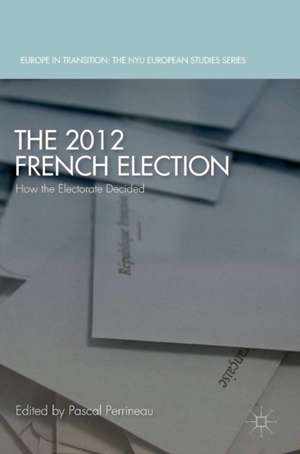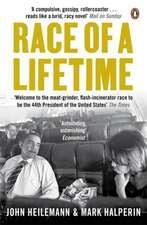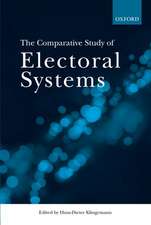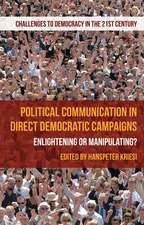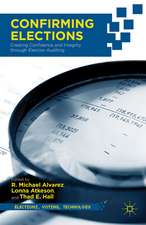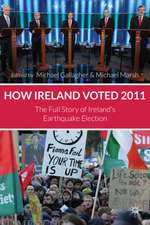The 2012 French Election: How the Electorate Decided: Europe in Transition: The NYU European Studies Series
Editat de Pascal Perrineauen Limba Engleză Hardback – 10 sep 2016
| Toate formatele și edițiile | Preț | Express |
|---|---|---|
| Paperback (1) | 636.80 lei 43-57 zile | |
| Palgrave Macmillan US – 9 iun 2018 | 636.80 lei 43-57 zile | |
| Hardback (1) | 641.20 lei 43-57 zile | |
| Palgrave Macmillan US – 10 sep 2016 | 641.20 lei 43-57 zile |
Din seria Europe in Transition: The NYU European Studies Series
-
 Preț: 299.09 lei
Preț: 299.09 lei -
 Preț: 307.88 lei
Preț: 307.88 lei -
 Preț: 307.68 lei
Preț: 307.68 lei -
 Preț: 301.53 lei
Preț: 301.53 lei - 8%
 Preț: 538.69 lei
Preț: 538.69 lei -
 Preț: 395.47 lei
Preț: 395.47 lei -
 Preț: 379.86 lei
Preț: 379.86 lei -
 Preț: 387.75 lei
Preț: 387.75 lei -
 Preț: 388.52 lei
Preț: 388.52 lei -
 Preț: 392.60 lei
Preț: 392.60 lei -
 Preț: 409.25 lei
Preț: 409.25 lei - 15%
 Preț: 698.62 lei
Preț: 698.62 lei - 15%
 Preț: 701.72 lei
Preț: 701.72 lei -
 Preț: 391.61 lei
Preț: 391.61 lei -
 Preț: 384.48 lei
Preț: 384.48 lei -
 Preț: 387.75 lei
Preț: 387.75 lei - 15%
 Preț: 639.41 lei
Preț: 639.41 lei - 15%
 Preț: 530.94 lei
Preț: 530.94 lei -
 Preț: 384.86 lei
Preț: 384.86 lei - 18%
 Preț: 786.66 lei
Preț: 786.66 lei -
 Preț: 388.72 lei
Preț: 388.72 lei -
 Preț: 386.99 lei
Preț: 386.99 lei - 14%
 Preț: 598.45 lei
Preț: 598.45 lei -
 Preț: 382.18 lei
Preț: 382.18 lei -
 Preț: 389.88 lei
Preț: 389.88 lei - 15%
 Preț: 644.18 lei
Preț: 644.18 lei -
 Preț: 389.88 lei
Preț: 389.88 lei -
 Preț: 386.39 lei
Preț: 386.39 lei -
 Preț: 390.25 lei
Preț: 390.25 lei -
 Preț: 388.72 lei
Preț: 388.72 lei -
 Preț: 388.72 lei
Preț: 388.72 lei -
 Preț: 388.72 lei
Preț: 388.72 lei -
 Preț: 389.70 lei
Preț: 389.70 lei -
 Preț: 386.81 lei
Preț: 386.81 lei -
 Preț: 387.38 lei
Preț: 387.38 lei - 5%
 Preț: 259.49 lei
Preț: 259.49 lei -
 Preț: 262.06 lei
Preț: 262.06 lei -
 Preț: 268.68 lei
Preț: 268.68 lei
Preț: 641.20 lei
Preț vechi: 754.36 lei
-15% Nou
Puncte Express: 962
Preț estimativ în valută:
122.71€ • 127.33$ • 102.56£
122.71€ • 127.33$ • 102.56£
Carte tipărită la comandă
Livrare economică 17-31 martie
Preluare comenzi: 021 569.72.76
Specificații
ISBN-13: 9781349949564
ISBN-10: 1349949566
Pagini: 236
Ilustrații: XVII, 243 p. 25 illus., 19 illus. in color.
Dimensiuni: 148 x 210 x 20 mm
Greutate: 0.44 kg
Ediția:1st ed. 2016
Editura: Palgrave Macmillan US
Colecția Palgrave Macmillan
Seria Europe in Transition: The NYU European Studies Series
Locul publicării:New York, United States
ISBN-10: 1349949566
Pagini: 236
Ilustrații: XVII, 243 p. 25 illus., 19 illus. in color.
Dimensiuni: 148 x 210 x 20 mm
Greutate: 0.44 kg
Ediția:1st ed. 2016
Editura: Palgrave Macmillan US
Colecția Palgrave Macmillan
Seria Europe in Transition: The NYU European Studies Series
Locul publicării:New York, United States
Cuprins
INTRODUCTION by Pascal Perrineau .- PART 1: Perceptions of the Campaign .- Chapter 1: Pre-determined Issues in the 2012 Presidential election by Gilles Finchelstein .- Chapter 2: The Candidates: Crystallized Images by Daniel Boy, Jean Chiche .- Chapter 3: Information Gathering and Campaign Following among Voters: The Paradox of Electoral Campaigns by Thierry Vedel .- PART 2: Voter Mobility and Mobilization .- Chapter 4: Electoral Turnout: Mobilization in all its Diversity by Anne Muxel .- Chapter 5: Fluctuations on the Left by Flora Chanvril, Henry Rey .- Chapter 6: Shifts in Voting Decisions on the Right: From a Centripetal Victory to a Centrifugal Defeat by Bruno Cautrès, Sylvie Strudel .- Chapter 7: Fluctuations between the Left and the Right: Expressions of Protest that Benefitted François Hollande by Anne Muxel .- Chapter 8: Fluctuations at the Center: a Short-lived and Fragile Breakthrough for François Bayrou by Pierre Bréchon .- PART 3: Making a Voting Choice .- Chapter 9: The Moment of Electoral Choice by Pascal Perrineau, Brice Teinturier .- Chapter 10: The Impact of Issues on Electoral Choice by Dominique Reynié .- Chapter 11: Narrowing the Gap in the Second Round or the ‘Referenda’ of the 6th of May 2012 by Jérôme Jaffré .- PART 4: Expectations of the Incoming President .- Chapter 12: Expectations of the New President by Mariette Sineau, Bruno Cautrès .- Chapter 13: A Review of the First Hundred Days: a ‘Normal’ presidency at a Time of Unprecedented Crisis by Jérôme Fourquet .- CONCLUSION by Pascal Perrineau .- BIBLIOGRAPHY.
Notă biografică
Pascal Perrineau is Distinguished Professor at Sciences Po Paris, France, and has advised numerous media and scientific projects. His research focuses mainly on electoral sociology, the extreme right in France and in Europe, and the new socio-political cleavages at work in European societies. He is the author of many works, including Le Vote normal (2012) and, with Dominique Reynié, Le Dictionnaire du vote (2001).
Textul de pe ultima copertă
This edited volume is based on a highly original survey carried out between November 2011 and June 2012 among a panel of 6,000 voters. The panel was interviewed on 12 separate occasions about how and why they made their voting choices. The book focuses on how electoral choices are made and how these choices evolve during the short time-span of an election campaign. The analysis of the 2012 electoral result shows more than ever that voting choices are the fruit of interweaving timelines: the long term period that characterizes voters’ predispositions and their predictions of a possible scenario; the shorter period of time during which the campaign unfolds where those predispositions are either confirmed, called into question, or undone; and the moment when the final choice is made. This is the first time the electoral decision-making process during a French Presidential election has been systematically studied.
Caracteristici
The first in-depth longitudinal electoral study of a French presidential election, now available in English Assembles a team of high-profile French election specialists to analyze this data on electoral choices and make case-specific and broader conclusions Presents the data and results from this groundbreaking study with a new introduction and conclusion for English-speaking readers
